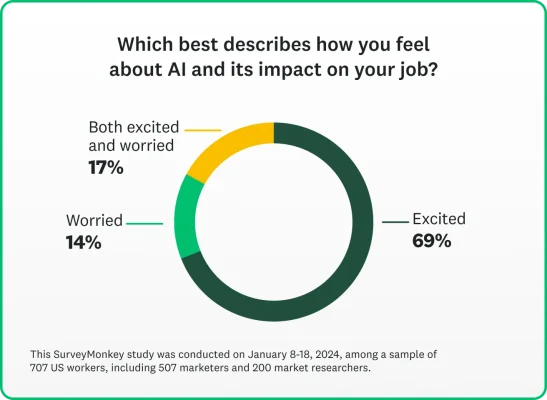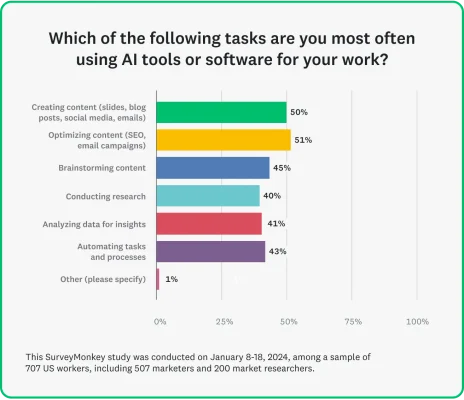28 AI marketing statistics you need to know in 2025
Discover how marketers use AI and dive into SurveyMonkey research on AI usage in marketing.

Artificial intelligence (AI) in marketing is skyrocketing. AI is helping enhance marketing processes and improve data analysis.
So, how can savvy marketers stay ahead of the AI curve in 2025? And how can you leverage AI to launch successful campaigns?
Read on for 28 AI in marketing statistics and how to leverage AI in your marketing strategy.
28 AI in marketing statistics
The marketing landscape has done a 180 since the onset of the COVID-19 pandemic. Is the rise of AI in marketing a new shiny toy, or is it here to stay? To uncover the answers, we conducted an AI marketing trends study and an AI in the customer experience study. Keep reading for our findings and other industry reports.
How marketers feel about AI

- 69% of marketing professionals feel excited about AI technology and its impact on their jobs (SurveyMonkey)
- 17% are excited and worried about AI’s impact on their job (SurveyMonkey)
- 60% are very optimistic about where their industry is headed (SurveyMonkey)
- 1% of marketers are very pessimistic about the direction of their industry (SurveyMonkey)
Marketing AI adoption
- 56% of marketers say their company is taking an active role in implementing and using AI (SurveyMonkey)
- 44% of companies are waiting for more established solutions before implementing AI (SurveyMonkey)
Implementation
- 32% of marketing organizations have fully implemented AI (Salesforce)
- 43% of marketing organizations report experimenting with AI (Salesforce)
Marketing uses cases for AI

- 51% use AI tools to optimize content, from email campaigns to search engine optimization (SurveyMonkey)
- 50% create content with artificial intelligence (SurveyMonkey)
- 45% use AI to brainstorm content ideas (SurveyMonkey)
- 43% of marketing professionals automate repetitive tasks and processes with AI software (SurveyMonkey)
- 43% think AI is important to their social media strategy (SurveyMonkey)
- 41% analyze data for insights with AI tools (SurveyMonkey)
- 73% say AI plays a role in creating personalized customer experiences (SurveyMonkey)
Reasons marketers aren’t adopting AI
- 39% of marketers aren’t sure how to safely use gen AI (Salesforce)
- 43% say they don’t know how to get the most value out of gen AI (Salesforce)
- 54% say gen AI training is important for using it in their role (Salesforce)
- 70% report their employer does not provide gen AI training (Salesforce)
Top AI challenges marketers are facing
- 50% of marketers foresee performance expectations increasing (SurveyMonkey)
- 49% of marketers and their teams expect to change tools and software (SurveyMonkey)
- 48% believe that they may see changes in strategy or direction (SurveyMonkey)
- 31% of marketers have accuracy and quality concerns about AI (Salesforce)
Future of using AI for marketing
- 70% of marketers expect AI to play a larger role in their work
- 48% say increasing AI adoption is a top goal
Consumers’ sentiments around AI in marketing
- Among Gen Zers, 66% were interested in AI that would help them through a product or website, 63% liked the idea of personalized deals, and 56% wanted tailored product recommendations (SurveyMonkey)
- 18% say they are “very confident” that they can detect chatbot interactions (SurveyMonkey)
- 90% of people prefer a human customer service representative to a chatbot (SurveyMonkey)
- 41% of people under 34 have negative feelings about the idea of companies using AI in CX vs 72% of people over 65 (SurveyMonkey)
Related reading: International perspectives on AI
What is AI in marketing?
AI in marketing is the use of artificial intelligence tools to streamline the duties of a marketer. Marketing teams can leverage AI to enhance brainstorming, content writing, and personalization efforts. Equally, AI tools can offer machine learning, which can help improve data analysis and empower data-driven decision-making.
10 must-know marketing AI use cases for 2025
1. Optimizing content
Optimizing content is the leading use case for artificial intelligence tools, according to SurveyMonkey research. This broad topic encompasses everything from adding SEO keywords to copy and reworking content for different audiences.
Over half (51%) of marketing teams use AI to optimize content.
2. Creating content
The second most popular use of AI in marketing is content creation. When feeding an AI tool a writing prompt, marketing teams can create content quickly.
Some marketing teams use AI to produce marketing materials like brochures, website designs, campaign plans, and written content. The extent to which marketers edit generated content varies depending on their trust and faith in AI content.
3. Personalization
Customer demographics, interactions, and behaviors—like reading a blog or clicking a link—can help marketers accurately predict and respond to customers.
For example, AI personalization can suggest related blogs on your website based on users' reading history.
4. Brainstorming content
One of the most useful deployments of artificial intelligence tools in marketing is brainstorming content. By creating a short brief or proposal and including a handful of ideas, marketing teams can ask generative AI tools to aid brainstorming sessions by providing new ideas.
Artificial intelligence tools draw from public data, so they can generate fairly basic ideas. However, their rapid generation can be valuable for teams seeking quick inspiration.
5. Automating tasks
Automation is the fourth most popular use case of AI in marketing. Artificial intelligence tools can train on datasets and use machine learning to replicate these processes.
For monotonous tasks, AI's automation of repetitive actions is a powerful time-saving tool. It allows marketing teams to focus on higher-priority activities and be more productive.
6. Social media monitoring
Forty-three percent of marketers think AI is important to their social media strategy—and 48% think it's somewhat important. Marketers use AI for social media monitoring to efficiently track and analyze many online conversations, providing real-time insights into customer sentiment and trends.
AI tools can identify patterns, detect potential issues early, and highlight brand mentions, enabling marketers to respond proactively. This helps improve brand reputation, customer engagement, and strategic decision-making.
7. Analyzing data
Data analysis is a vital part of marketing. Artificial intelligence tools can expedite collecting data and identifying patterns in datasets.
Marketing teams can deploy AI to help them analyze data on a larger scale, providing them the insight they need to develop and launch campaigns effectively. For example, businesses can use AI-powered market research tools to streamline market research datasets, providing more rapid insight.
8. Conducting research
Forty percent of marketers use artificial intelligence to conduct research. AI tools, like SurveyMonkey Genius®, help marketers gain product, market, brand, and customer insights.

AI enhances response rates and data quality by offering question suggestions and ensuring an optimal survey length and format.
AI also helps marketers analyze insights like data scientists. Response Quality uses machine learning to identify poor-quality responses and clean data so you can focus on high-quality survey data. Sentiment Analysis helps you further analyze text responses to pinpoint feedback sentiment.
9. Consumer journey mapping
Marketers use AI for customer journey mapping.
AI analyzes behavioral data to uncover patterns and predict customer needs, leading to more targeted and timely interactions. This enhances customer satisfaction and loyalty by ensuring seamless and relevant experiences throughout their journey.
10. Chatbots and virtual assistants
AI chatbots and virtual assistants can provide instant, 24/7 customer support.
These chatbots can also gather valuable data on customer preferences, which marketers can analyze to refine strategies and personalize future interactions.
Advantages of AI in marketing
Here are some of the most important advantages of AI in marketing:
- Speed: While artificial intelligence tools do not show impressive creativity, they have an enormous speed advantage over humans. For example, it could generate 100 ideas for a marketing campaign in a fraction of the time it would take for a marketing team to do the same. Leveraging AI’s speed is one of the most impressive advantages of AI in marketing.
- Breadth of knowledge: AI platforms' wide knowledge base makes them a great resource for research and brainstorming.
- Automation: Another advantage of using AI in marketing automation. By delegating repetitive tasks to AI, marketing teams can spend more time on tasks that generate profits.
These advantages provide cost savings to marketing teams, helping them improve the bottom line and produce campaigns faster.
Disadvantages of AI in marketing
Although AI in marketing has several advantages, there are also disadvantages to be aware of.
Businesses should understand and take steps to adapt to the following disadvantages of AI in marketing:
- Data bias: Artificial intelligence platforms reproduce the inherent bias in the data they were trained on. If you are not careful when selecting and cleaning training data, the content you produce with AI may be full of bias.
- Lack of creativity: AI tools are trained on publicly available data. Due to this, AI generates ideas that stem from pre-established campaigns and ideas. If you are looking for an innovative campaign idea or something to set your business apart, AI tools may not be the correct solution for you.
- Privacy concerns: Artificial intelligence regulation is still in its early days, meaning that many of the widely available tools currently on the market are in a compliance gray area. Regulations could change, and teams must have processes to adapt to evolving regulatory standards.
5 steps to use AI in your marketing strategy
1. Define your objective and goals
The first step toward successful AI integration is to understand why you want to use these tools in the first place. A core goal or actionable plan for AI will provide a roadmap to successful onboarding.
Before you select tools or start testing AI platforms, list goals or tasks on which you’d like to use AI, such as automating tasks or improving keyword targeting. By starting with the result you’d like to gain, you can make a clear strategy that will get you from A to B.
2. Assess current capabilities
Before defining your AI goals, evaluate your current resources and identify areas where AI can add the most value. For example, if your marketing team excels at content marketing, you may not need a content AI developer. However, if you're struggling to scale personalization efforts, AI could be a perfect solution to improve efficiency and reach.
By assessing your team's strengths and weaknesses, you can pinpoint where AI integration will have the greatest impact. Gathering employee feedback is a great way to understand where AI could be most beneficial in your workforce.
3. Choose the right AI tools
Once your marketing team has established what use cases you want to focus on, it’s time to look for AI tools.
To find the one that’s best for your team, consider:
- The scope of the tool: Does the AI platform focus on the exact use case you’re looking for, or is it more general?
- Your total budget: Does your marketing team have the budget to cover the tool for an extended period?
- The ease of integration: Will the AI tool you’ve selected easily integrate into your current tech stack?
- The required knowledge: Some AI tools, especially those related to data analysis, may have a steep learning curve. Using some platforms may require you to offer training to your staff members.
Based on your response to these questions, you can rule out certain tools. A platform may be too expensive, too complex, or simply incompatible with your current data architecture.
4. Test and analyze AI data
One of the disadvantages of artificial intelligence in marketing is that AI data is prone to bias and hallucinations. Don't allow these factors to hinder progress. Regularly collect, test, and analyze AI data to pinpoint and remove these biases.
Businesses should review any AI-generated content. While this step will slow down your team, it ensures copy and designs meet your brand standards.
Related reading: Turn feedback into actionable insights with survey analysis
5. Optimize AI marketing strategy
Your AI marketing strategy will naturally evolve. As with all new projects, it’s important to set benchmarks, measure progress, and look for areas for optimization.
When it comes to AI in marketing, your staff will be the primary people who will have contact with the tools.
Pro-tip: Ask for feedback by sending out an employee engagement survey. You can do this periodically to trace how the uses of AI in your business evolve.
Frequently asked questions: AI in marketing
- What are marketers' attitudes towards AI in marketing?
- What percentage of marketers use AI?
- What is the role of AI in the future of marketing?
Power your marketing strategy with SurveyMonkey
Using AI in your marketing could help improve processes and generate more ROI from your campaigns.
SurveyMonkey Genius® helps marketers do just that. Marketers can build highly responsive surveys to collect customer insights that inform successful marketing efforts. Discover how you can use SurveyMonkey Genius to enhance your marketing strategy or sign up for an account.
Discover more resources

Understand your target market to fuel explosive brand growth
Brand marketing managers can use this toolkit to understand your target audience, grow your brand, and prove ROI.

Customer Behavior Analysis: A Complete Guide and Examples
Read our step-by-step guide on conducting customer behavior analysis. Learn how to collect data and improve customer touchpoints.

Survey Analysis Report: How to Create, Tips & Examples
Presenting your research soon? Learn the most effective way to use a survey analysis report. See sections to include and report best practices.

What is agile market research and how to use it
Conduct market research faster for real-time insights and smart decision-making. Learn what agile market research is and how to apply the framework.